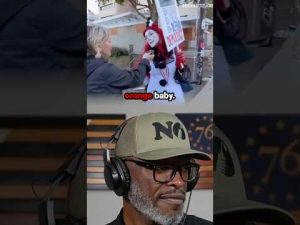In a recent segment that could only be described as a curious blend of confusion and comedic imagination, viewers of a conservative news channel were treated to insights about the voting habits of some individuals who proudly identify as Democratic voters. The exchanges highlighted a troubling trend—many people seemed to vote along party lines without a real understanding of the candidates or their policies. It’s as if a mysterious, party-aligned fog had settled in, clouding their judgment and understanding of local governance and their elected officials.
In a playful jab at how some citizens approach voting, the commentators suggested that these voters might be akin to children in a classroom, eagerly chanting the letter “D” as if it were a magic spell. “Here’s your socialism, sucker!” they quipped, as if pointing out the irony in blindly supporting a party that may not always serve their best interests. Whether it was a city council member or a mayor, many appeared blissfully unaware of who was even representing them. Instead of taking a moment to research the issues that truly impact their lives, these voters seemed more focused on the propaganda that surrounded them.
The conversation continued down a familiar avenue, with a critical look at Republican voters as well. While it was acknowledged that there are indeed some decent folks within the Republican party, the sentiment was clear: many feel let down by their representatives. This reflection raised a pertinent question—are these voters even aware of the reasons behind their disillusionment? It seems that in a world of fast-paced information and social media, being informed is a luxury that fewer people seem to afford themselves.
Toss into the mix a discussion about the former president, Donald Trump. The analysis suggested that his detractors often critiqued him without understanding why. The explanation of general disdain devolved into muddled confessions, revealing a lack of genuine reasoning behind the negativity. It’s as if, among these democratic voters, disliking Trump had become a social norm, a trend to be followed rather than a reasoned stance based on facts. This situation points to a larger issue—party loyalty sometimes blinding people to rational thought.
In the end, the segment was nothing if not eye-opening. It underscored an alarming reality about political awareness—or the lack thereof—among citizens. Instead of engaging in thoughtful dialogues and educating themselves on issues that matter, many appear content to float along on the currents of partisan sentiment. In a democratic society where the power lies in the hands of the voters, such apathy should encourage all Americans to reassess who they support and why. It’s no laughing matter, but at least through humor, maybe some light can be shed on the need for more informed decision-making at the ballot box.







